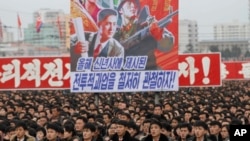The advocacy group Human Rights Watch Friday once again designated North Korea as one of the world’s most abusive and repressive states in its annual global report.
A groundbreaking 2014 United Nations Commission of Inquiry report on human rights abuses in North Korea said, “The gravity, scale and nature of these violations reveal a State that does not have any parallel in the contemporary world.”
The report documented ongoing atrocities that include a network of political prisons where between 80,000 and 120,000 inmates are sent, often with their entire families, as well as widespread and systematic atrocities that include torture, enslavement, forced labor, rape and murder.
The U.N. General Assembly voted in 2014 to refer the Kim Jong Un government of North Korea to the International Criminal Court (ICC) for crimes against humanity. The measure stalled in the U.N. Security Council where the North’s allies, China and Russia, have reportedly blocked the measure from being enacted.
Existential threat
Since the report was issued, Phil Robertson, the deputy director of Human Rights Watch's Asia division, says there has been no improvement in the human rights situation in North Korea.
“It’s gotten worse actually. One of the areas where we looked at quite closely this time was the punishing of people who tried to leave North Korea illegally, and also people who were trying to get information from outside into North Korea,” he said.
North Korea has denied or contested international criticism of its human rights situation. In November, North Korean U.N. Counselor Ri Song Chol said a recent resolution condemning the human rights situation in his country was "full of lies, fabrications," and he called it "an illegal and unlawful document, a plot, which is not worth consideration."
High-ranking North Korean defector Thae Yong-ho, who was Kim Jong Un’s deputy ambassador in London before he fled to South Korea in July, recently said the leadership in Pyongyang views human rights criticism as an existential threat. If widely disseminated in North Korea, he said, it could undermine the carefully nurtured public image of Kim as a near infallible leader.
Robertson said in the last year North Korea has also tried to crack down on outside information entering the country through external media drives loaded with critical news reports and oppositional political messages, and also with popular South Korea movies and TV series.
China
Human Rights Watch also criticized China for refusing to treat North Koreans who escape across the border as refugees. Beijing labels all North Koreans who enter the country illegally as “economic migrants” looking for food and employment and not seeking political asylum. If apprehended by Chinese authorities, undocumented North Koreans are forcibly repatriated.
Robertson said North Koreans fleeing their country, for whatever reason, are escaping a repressive state and face certain persecution, physical abuse and even the threat of death if they are forced to return.
“Every single North Korean sent back by China was tortured. They were tortured to find out where they went, who they were talking to, and to try to ascertain what possible threats their overseas activities might post to North Korea,” he said.
Robertson called on the Beijing government to uphold the 1951 Refugee Convention and its 1967 Protocol - which China signed - that prohibits returning refugees. It also defines the refugee designation as people who left their countries and have a well-founded fear of persecution, and if returned could face a threat to their lives and freedom.
Trump
During the administration of President Barack Obama, the United States has led international efforts to pressure Kim Jong Un to improve the human rights situation in North Korea through diplomatic action and economic sanctions.
The U.N. sanctions on North Korea do not mention human rights violations. These measures were imposed for the North’s continued development of nuclear weapons and ballistic missiles in defiance of international resolutions banning these programs.
In July the United States blacklisted Kim Jong Un along with 22 other entities and individuals for their role in serious human rights violations, hunting down defectors, and for censorship in North Korea.
This week, the U.S. Treasury Department placed Kim Yo Jong, 27 - who it said is the younger sister of Kim Jong Un - and other officials on an expanded sanctions list of North Koreans for human rights abuses.
President-elect Donald Trump has not yet addressed international efforts to hold North Korean leaders accountable for widespread and systematic human rights abuses.
Robertson urges the incoming president to prioritize human rights in the same way that past administrations have.
“We want to make sure that the baton is passed in a smooth way between the Obama administration and the Trump administration to continue the focus on human rights and North Korea. And obviously if we don’t see that, we will be very critical of the Trump administration going forward,” said Robertson.
Youmi Kim contributed to this report.






